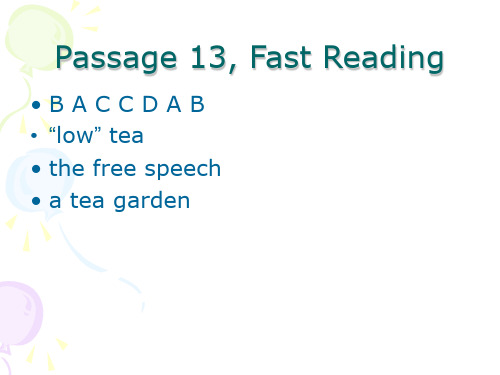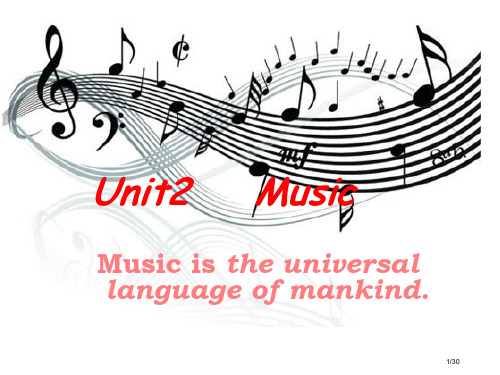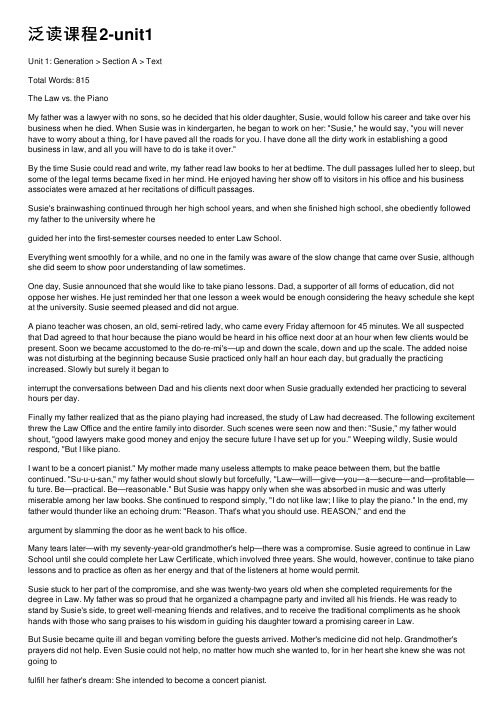大学英语泛读教程2PPT教学课件-Review 01
unit 2 泛读.ppt

3. The villager’s life was turned upside down but Nasir and his family were as happy and pleased as before.
(contrast)
(Para. 4) … but still the citizens of the village were not happey.
Part III: (Paras. 7 – 12): The task of developing critical societies is a Herculean one.
Para. 7: topic sentence and background information.
Paras. 8 -- 10: There are many barriers to critical thought. -- Para. 8: human egocentricity, sociocentricity, self-delusion, narrowmindedness -- Para. 9: fear, human insecurity, human habits, bureaucracy -- Para. 10: Then for us who are teaching, student resistance to critical thinking is an obstacle.
… Nasir and his family were happy and pleased.
4. The village became the same as it was before, thanks to Nasir’s wish.
• The children could not wait anymore …
外教社泛读教程2网络课件

Extensive Reading (Book 2)Unit 1 The Shadowland of Dreams1. Ieaching ObjeclivesGio over the whole lext in limiled lime and lry Lo gel the main idta of lhe passage(iel som1 information aboul lhe author Masler lhe Keading skillsII. Teaching Importance ad Diticulies1. The usage of new words and plrases2. Using context clues to find out the meaning of words3. UInderstanding paragraphs-How to identifty thc Main ldca.4. Rading sills: Using the DictionaryII. Teasching Melhods: Discussing, Practicing, and F:xcrcising.IV. Teaching Time: 4 periodsV Teaching Conltenl1. Lead-inWhat are your drcams?What will you do if you meet some troubles on the course of realizing your dream?2. Related information1) anuthor亚历克斯哈利(1921-1992)Alexander Muray Pulmer Ilaley (August 11, 1921-Tebruary 10. 1992) was anAmerican wriler. Ile is best known as the author of Rools.非洲商的美国作家。
泛读教程第二册课后答案及上课PPTunit1.

Detailed study of Text A
• Lead-in Question 1. What kind of materials do you always read? Question 2. How do you think of your reading speed? Question 3. What kind of problems do you always encounter while you trying to read faster?
• Besides context clues, semantic relationships are helpful in guessing unknown words
1. Class relationship
Mr. Johnson’s paintings contain circles, squares, triangles, etc.
• The details are the proof or explanation that supports the main idea.
Read the passage on the first page
Questions for discussion: 1. what are the functions of details ? 2. What is a topic sentence? 3. What is the location of the topic sentence?
1st reading of the text
• Do exercises in Reading Comprehension on P. 6.
• Text Analysis
According to the author, how can a person learn to read faster? (Para.1-3)
《英语泛读教程2》教案

Extensive Reading (Book 2)Unit 1 The Shadowland of DreamsI. Teaching ObjectivesGo over the whole text in limited time and try to get the main idea of the passageGet some information about the author Master the Reading skillsII. Teaching Importance and Difficulties1. The usage of new words and phrases2. Using context clues to find out the meaning of words3. Understanding paragraphs-How to identify the Main Idea.4. Reading skills: Using the DictionaryIII. Teaching Methods: Discussing, Practicing, and Exercising.IV. Teaching Time: 4 periodsV. Teaching Content1. Lead-inWhat are your dreams?What will you do if you meet some troubles on the course of realizing your dream? 2. Related information1) author亚历克斯•哈利(1921-1992)Alexander Murray Palmer Haley (August 11, 1921-February 10, 1992) was an American writer. He is best known as the author of Roots. 非洲裔的美国作家。
泛读2unit2music市公开课一等奖省赛课微课金奖PPT课件

Woodie Guthrie (1912-1967)
12/30
In the 1950s
• Martin Luther King • We shall overcome,
we shall overcome,
–Lead peaceful
we shall overcome someday.
• 1930s:
Great depression in US
10/30
Country music in 1920s
Representative figure-Jimmie Rodgers: • An American country singer in the early
20th century known most widely for his rhythmic yodeling(布鲁斯格调真假声唱 法).
• recognized as a rock icon and a gifted, prolific songwriter.
15/30
Part II Rock’n’ roll
Origin
favored by
cause
representative
Rock’n’roll Ray people regard his ballads as historic and deeply humanistic accounts of the disasters in the 1930s and the struggle for migrant workers’ rights, and as powerful images of the urban poor.
大学英语之泛读教程第二册unit-6PPT课件

Paras. 1 – 5: The bonding between the author and his father.
Paras. 6 – 10: The bonding between the author and his son.
Para. 11: The bonding between the author and his step-father.
In Africa and Southern Asia, large national parks have been set up to preserve animals in particular. The land within these national parks is owned by the government, but there are many private developments, such as hotels and shops, for the visitors who come to see the animals.
My job is to provide relevant, factually accurate information, but not to make an advertisement for you.
-
4
Paras. 3 and 4 (Secondly)
My job is to write stories that make sense and are easy and pleasant to read, but not to print word of jargon and marketing waffle that spews from your lips.
泛读课程2-unit1

泛读课程2-unit1Unit 1: Generation > Section A > TextTotal Words: 815The Law vs. the PianoMy father was a lawyer with no sons, so he decided that his older daughter, Susie, would follow his career and take over his business when he died. When Susie was in kindergarten, he began to work on her: "Susie," he would say, "you will never have to worry about a thing, for I have paved all the roads for you. I have done all the dirty work in establishing a good business in law, and all you will have to do is take it over."By the time Susie could read and write, my father read law books to her at bedtime. The dull passages lulled her to sleep, but some of the legal terms became fixed in her mind. He enjoyed having her show off to visitors in his office and his business associates were amazed at her recitations of difficult passages.Susie's brainwashing continued through her high school years, and when she finished high school, she obediently followed my father to the university where heguided her into the first-semester courses needed to enter Law School.Everything went smoothly for a while, and no one in the family was aware of the slow change that came over Susie, although she did seem to show poor understanding of law sometimes.One day, Susie announced that she would like to take piano lessons. Dad, a supporter of all forms of education, did not oppose her wishes. He just reminded her that one lesson a week would be enough considering the heavy schedule she kept at the university. Susie seemed pleased and did not argue.A piano teacher was chosen, an old, semi-retired lady, who came every Friday afternoon for 45 minutes. We all suspected that Dad agreed to that hour because the piano would be heard in his office next door at an hour when few clients would be present. Soon we became accustomed to the do-re-mi's—up and down the scale, down and up the scale. The added noise was not disturbing at the beginning because Susie practiced only half an hour each day, but gradually the practicing increased. Slowly but surely it began tointerrupt the conversations between Dad and his clients next door when Susie gradually extended her practicing to several hours per day.Finally my father realized that as the piano playing had increased, the study of Law had decreased. The following excitement threw the Law Office and the entire family into disorder. Such scenes were seen now and then: "Susie," my father would shout, "good lawyers make good money and enjoy the secure future I have set up for you." Weeping wildly, Susie would respond, "But I like piano.I want to be a concert pianist." My mother made many useless attempts to make peace between them, but the battle continued. "Su-u-u-san," my father would shout slowly but forcefully, "Law—will—give—you—a—secure—and—profitable—fu ture. Be—practical. Be—reasonable." But Susie was happy only when she was absorbed in music and was utterly miserable among her law books. She continued to respond simply, "I do not like law; I like to play the piano." In the end, my father would thunder like an echoing drum: "Reason. That's what you should use. REASON," and end theargument by slamming the door as he went back to his office.Many tears later—with my seventy-year-old grandmother's help—there was a compromise. Susie agreed to continue in Law School until she could complete her Law Certificate, which involved three years. She would, however, continue to take piano lessons and to practice as often as her energy and that of the listeners at home would permit.Susie stuck to her part of the compromise, and she was twenty-two years old when she completed requirements for the degree in Law. My father was so proud that he organized a champagne party and invited all his friends. He was ready to stand by Susie's side, to greet well-meaning friends and relatives, and to receive the traditional compliments as he shook hands with those who sang praises to his wisdom in guiding his daughter toward a promising career in Law.But Susie became quite ill and began vomiting before the guests arrived. Mother's medicine did not help. Grandmother's prayers did not help. Even Susie could not help, no matter how much she wanted to, for in her heart she knew she was not going tofulfill her father's dream: She intended to become a concert pianist.And she did just that. Years later, after Susie became a concert pianist of some fame and a visiting lecturer at one of the best universities on the East Coast, Father was almost as proud of her as he would have been to see her a lawyer. But he never did admit that Susie is a reasonable woman.(注:可编辑下载,若有不当之处,请指正,谢谢!)。
英语泛读教程Book2答案课件PPT

Answer Analysis
• Answer 4: This answer correctly identifies the main idea of the passage and provides a detailed explanation of how extensive reading can help learners improve their language skills. It also includes examples to illustrate the benefits of extensive reading and suggests practical ways for learners to incorporate extensive reading into their language learning routine.
• Answer 6: This answer correctly identifies the main idea of the passage and provides a detailed explanation of how extensive reading can help learners improve their language skills. It also includes examples to illustrate the benefits of extensive reading and suggests practical ways for learners to incorporate extensive reading into their daily routine, such as setting aside time each day for reading and making notes while reading.
- 1、下载文档前请自行甄别文档内容的完整性,平台不提供额外的编辑、内容补充、找答案等附加服务。
- 2、"仅部分预览"的文档,不可在线预览部分如存在完整性等问题,可反馈申请退款(可完整预览的文档不适用该条件!)。
- 3、如文档侵犯您的权益,请联系客服反馈,我们会尽快为您处理(人工客服工作时间:9:00-18:30)。
2. Julie _____i_n_cu_r_r_e_d______ the anger of her parents by staying out all night.
Review 01-p.38
B Multiple Matching
Look at the four paragraphs(A-D) that deal with the deniers claims. In which paragraph does the author mention …
__D___ 1. a claim that focuses on a really small percentage? __A___ 2. two different parts of one continent? __C___ 3. a hope that may be unrealistic? __A___ 4. a measurement of weight?
Review 01-p.37
Track 8
C. We’re clever. We’ll adapt.
Should we be so optimistic? The U.S. spent over $100 million on emergencies arising from climate issues between 2011-2012 alone. In the future, even the developed nations will struggle with the costs incurred by climate change. Developing nations are always hit hardest by drought and famine. How will they cope when things get really serious?
3. The charity has received ___o_v_e_r_w_h_e_l_m_i_n_g___ support for its campaign. 4. We complained ___v_e_h_e_m__e_n_t_ly_____ about the long delay at the airport. 5. The leader played a(n)_p_r_om__in_e_n_t__ role in shaping the campaigner’s
D. Global warming is slowing down.
There is an element of truth in this, in that the Earth’s surface may not be getting hotter at a faster rate. According to NASA research, however, this is another misleading claim because more than 90 percent of global warming is heat that is trapped in the world’s oceans and seas.
– Stanley Sue, Professor of Psychology, Palo Alto University
Review 01-p.37
Track 8
Though an overwhelming body of scientific evidence supports the conclusion that man-made climate change is a reality, some scientists continue to express doubts over the seriousness of the problem. Indeed, a number of scientists deny that climate change is occurring. In some cases, environmental campaigners have exposed conflicts of interests on the part of these “deniers.” For example, the prominent astrophysicist Willie Wei-Hock Soon, who has claimed that climate change is not manmade but caused by solar variation, has received large sums of money from oil and coal companies. Although Soon has vehemently rejected claims that he has been unduly influenced in his views, it seems fair to be skeptical of some of these skeptics.
c. Science is about agreement.
d. Skepticism is an important part of science. B 2. Why does the author say “it seems fair to be skeptical of the skeptics”? Detail
“Skepticism is essential to science; consensus is foreign.” – Richard S. Lindzen, Professor of Meteorology, MIT
“Scientific skepticism is considered good … Skeptics demand that evidence and proof be offered before conclusions can be drawn.”
activity is not causing climate change.
It is true that ice ages have come and gone in cycles during the course of history. However, these earlier shifts were caused by fluctuations in the Earth’s orbit. Recent increases in global temperatures have happened during the last 150 years, a time period that has seen C02 levels rocket by 40 percent. That’s quite a coincidence.
B? Inference
a. confusion
c. mystery
b. irony
d. surprise
Review 01-p.38
B 4. Astrophysicist Willie Wei-Hock Soon______. Detail a. supports the view that climate change is a result of human activities b. is one of the “deniers” who is skeptical of the cause of climate change c. received large sums of money for his contribution to tackle climate change d. is right about his view on climate change
B 5. What can we infer from Paragraph C about the author’s attitude? Inference a. optimistic about the climate change b. skeptical of the optimism c. pessimistic about the climate change d. indifferent toward the climate change
Review 01-p.37
Track 8
A recent article in Rolling Stone magazine addressed some of the main claims that are made by climate change “deniers,” and how they are fundamentally mistaken. Here is a brief summary:
A. The amount of ice in Antarctica is actually increasing.
This is simply not true. While the Antarctica’s coastal ice sheets have been expanding over the last few years, the continent’s inland sheets decreased by an astonishing 1,350 tons between 2011-2013. Worse still, the rate of decline is speeding up and causing sea levels to rise worldwide.
Review 01-p.37-38
